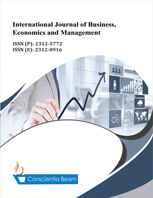Financial Development and Economic Growth in Nigeria: New Evidence from a Threshold Autoregressive and Asymmetric Analysis
DOI:
https://doi.org/10.18488/journal.62.2021.83.207.218Abstract
Financial development is concerned with policies, procedures and initiatives to increase the financial access, depth and productivity of financial institutions and financial markets. To that regards, this paper investigates the asymmetric relationship between financial development and economic growth by incorporating financial globalization uncertainty and inflation into a production function covering the Nigerian economy from 1980–2019. The threshold Autoregressive co-integration and nonlinear autoregressive distributed lag techniques are applied to examine the asymmetric cointegration between the variables, as well as the degree of the relationship among the variables. The results indicate long-run relationship between the parameters in the light of asymmetries. The asymmetric estimation results show that positive shock of financial development dampen economic growth. By comparison, symmetrically, the negative shock of the financial development improves the productivity growth of the Nigerian economy. Finally, while inflation shows a positive relationship, the financial globalization uncertainty indicates insignificant result. The implications of the said findings for productivity policies in Nigeria are also discussed.

